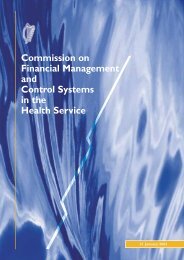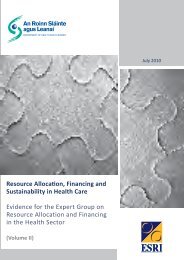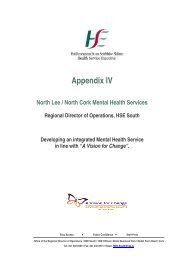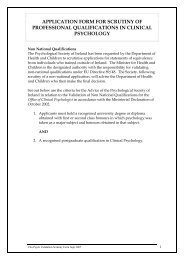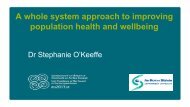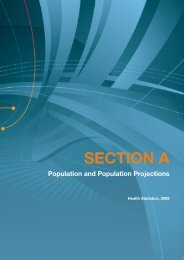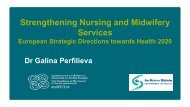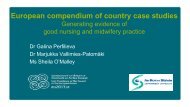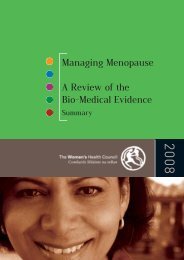All Ireland Traveller Health Study Our Geels - Department of Health ...
All Ireland Traveller Health Study Our Geels - Department of Health ...
All Ireland Traveller Health Study Our Geels - Department of Health ...
You also want an ePaper? Increase the reach of your titles
YUMPU automatically turns print PDFs into web optimized ePapers that Google loves.
<strong>Health</strong> Survey Findings<br />
The general recommendations <strong>of</strong> the report include a focus on the need to meaningfully engage with<br />
parents <strong>of</strong> <strong>Traveller</strong> children, in particular through community development and relationship building<br />
with educational providers. Inclusionary education strategies within preschool, primary and postprimary<br />
educational settings were viewed as essential in allowing <strong>Traveller</strong> children to fully enjoy their<br />
right to education. Further, recommendations included an emphasis on equality, inter-agency support<br />
and adequate funding <strong>of</strong> specialised assistance programmes. Within third-level education, the Strategy<br />
emphasised the need for alternative entry routes, support and mentoring <strong>of</strong> those <strong>Traveller</strong>s entering<br />
third-level education.<br />
In Northern <strong>Ireland</strong>, data from Connolly and Keenan (2002) suggest that<br />
• 18% <strong>of</strong> <strong>Traveller</strong> children access preschool or nursery compared to 58% <strong>of</strong> the general population.<br />
• 59% <strong>of</strong> <strong>Traveller</strong>s aged between 16 and 24 years leave school with no qualifications, compared to<br />
17% <strong>of</strong> this age group in the general NI population.<br />
• 92% <strong>of</strong> <strong>Traveller</strong>s have no GCSEs or higher qualifications.<br />
Income Adequacy<br />
The <strong>Department</strong> <strong>of</strong> Environment Northern <strong>Ireland</strong> Census 2001, counted 1,710 <strong>Traveller</strong>s in<br />
Northern <strong>Ireland</strong>. Features <strong>of</strong> multiple disadvantages experienced by <strong>Traveller</strong>s included long-term<br />
unemployment - only 11% are in paid employment whilst 70% who are economically active have<br />
had no paid work in the last 10 years. In Northern <strong>Ireland</strong> 89% were unemployed compared to 4% for<br />
the general population (<strong>Department</strong> <strong>of</strong> the Environment, 2001). In the 2006 census in the Republic <strong>of</strong><br />
<strong>Ireland</strong> (Central Statistics Office, 2007c) the unemployment rate for <strong>Traveller</strong>s was 75% compared to 9%<br />
for the general population.<br />
Research into the economic activities <strong>of</strong> <strong>Traveller</strong> culture identifies an emphasis on income generation<br />
rather than wage employment. However with increasing regulation and enforcement in work<br />
areas associated with <strong>Traveller</strong>s (e.g. recycling, waste disposal, horse trading) opportunities for selfemployment<br />
have become more difficult to find. Barriers to <strong>Traveller</strong>s accessing the labour market<br />
include educational standard, lack <strong>of</strong> role models and discrimination. The majority <strong>of</strong> <strong>Traveller</strong>s are<br />
unemployed and are dependent on social welfare payments. This <strong>of</strong>ten results in families living in<br />
poverty trying to cope with the increasing costs <strong>of</strong> basic services, as well as the struggle to feed and<br />
clothe large families (Report <strong>of</strong> the Task Force on the Travelling Community, 1995).<br />
The Report <strong>of</strong> the Task Force on the Travelling Community stated that it was important that the full<br />
range <strong>of</strong> employment and training options are open to <strong>Traveller</strong>s and that institutional or discriminatory<br />
obstacles are removed. The links between <strong>Traveller</strong> cultural identity and traditional employment types<br />
were recognised. In order to fully exploit these links, a need has been identified to take account <strong>of</strong><br />
traditional structural characteristics <strong>of</strong> <strong>Traveller</strong> economic activity in implementing culturally reinforcing<br />
employment policies. This involves a community development model that establishes a ‘logic <strong>of</strong><br />
empowerment’ which aims ‘to help remove shame <strong>of</strong> self or the will to hide one’s differences when<br />
they are compared to the ‘norm’ or majority’.<br />
11



